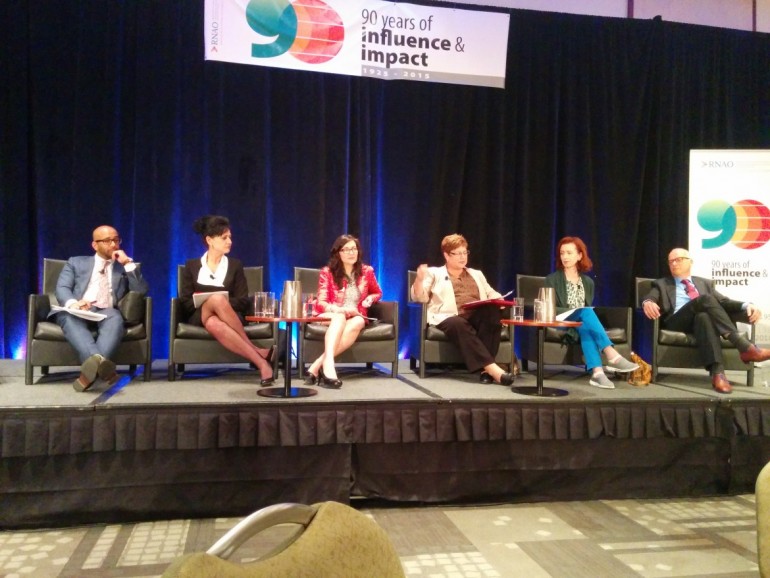
The Panel. From left to right: Rahool Agarwal, associate at Norton Rose Fulbright Canada LLP; Dr. Vanessa Burkoski, RNAO president; Lesley Hirst, president of RNAO’s palliative care nurses interest group; Michelle O’Rourke, member of RNAO’s parish nursing interest group; Maureen Taylor, physician assistant and widow of Dr. Don Low; Dr. Peter Van Bogaert, professor at Antwerp University in Belgium. (Edward Bayley)
By Edward Bayley
Concerns regarding doctor-assisted suicide were raised at a panel discussion held by the Registered Nurses Association of Ontario (RNAO) as the keynote event of their annual general meeting.
RNAO president, Dr. Vanessa Burkoski, said the panel, titled End of Life: Voices and Perspectives, was held with the hopes it would help fuel a dialog about end of life care – which now includes doctor-assisted suicide.
“We have to acknowledge ‘what does the patient want?’,” – Maureen Taylor
“The expectation is that today will be exponential, that you will go home and have a conversation with your own family and friends, with your colleagues and peers, with other respected organizations, that want to have their say in this public debate,” she said.
Unfortunately the hour dedicated to the topic was not nearly long enough.
The event started late, and after the opening remarks from the six panelists, there was only time for about a dozen of the 570 attendees to have their voices heard.
Implementing doctor-assisted suicide
Those who were able to speak, along with the resounding applauses from the rest of the crowd, made it clear that there are a number of questions and concerns throughout the medical industry surrounding both the implementation of doctor-assisted suicide.
One of the biggest issues, and priorities of the RNAO, is ensuring patients know their options.
One attendee raised the concern that some doctors don’t like to entertain the idea of palliative care as an option because they see that as a failure on their part.
Maureen Taylor, a panel member and the widow of Dr. Don Low who released a video in 2013 asking for the Canadian government to legalize doctor-assisted suicide, agreed, stating that her husband went through unnecessary chemo because his oncologist had that type of mindset.
“We have to acknowledge ‘what does the patient want?’,” said Taylor.
End-of-life care today
The majority of the questions though, were regarding the current state of end-of-life care.
Another of the panelists and president of the RNAO’s palliative care nurses interest group, Lesley Hirst, said Canada ranks ninth out of 40 countries in terms of quality of palliative care.
“Ninth is simply not good enough,” said Hirst.
Going forward
The nurses, who made up the vast majority of the crowd, voiced their concerns about how Canadian patients are labelled and how those labels affect the care available to them, how that affects access to medication, and a lack of education for both the public and health care professionals.
The panel discussion provided few answers, but the RNAO wants to continue to create a dialog.
They will be hosting webcasts starting in the fall that will be open to the public.
Anyone with questions of their own or who’s interested in joining the conversation should keep an eye on their website.

